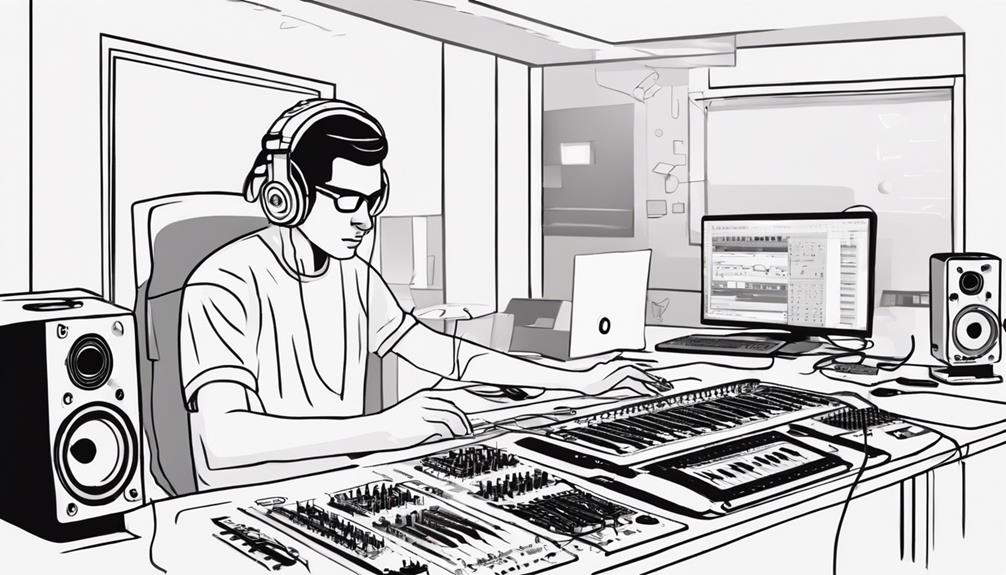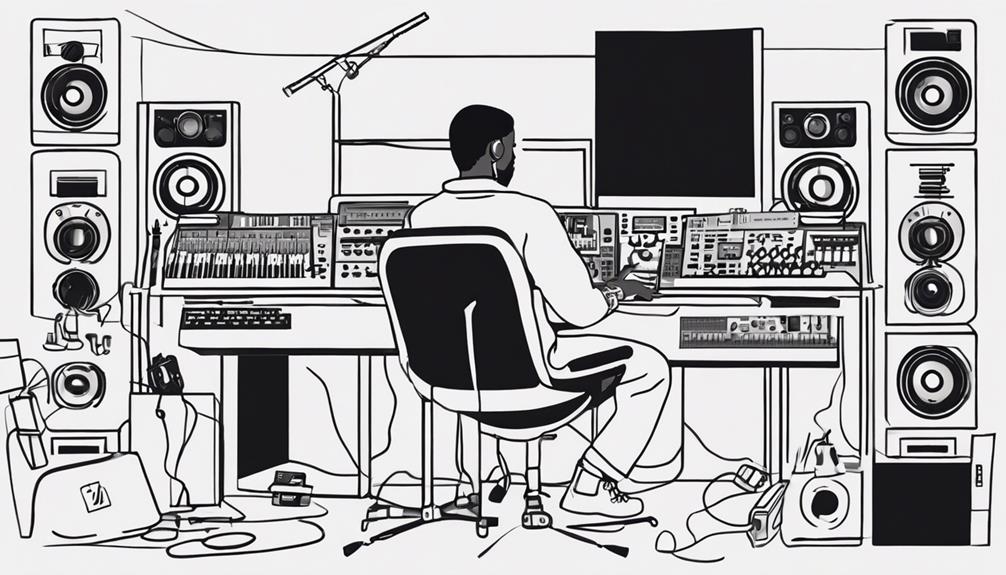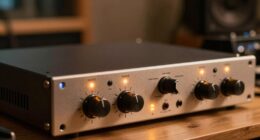If your heart beats in sync with creative melodies and you can't resist the call of rhythm, music production may be your path. Check if you have musical knowledge, technical skills, creativity, and a strong work ethic. Embrace new genres, collaborate with others, and learn to handle criticism. Prioritize tasks, set goals, and meet deadlines effectively. Stay updated on industry trends and aim to create impactful music. If this sounds like you, there's more to learn about qualities needed, nurturing creativity, interpersonal skills, and embracing challenges.
Key Takeaways
- Assess your musical knowledge and interest in learning technical skills.
- Evaluate your creativity and willingness to experiment with different sounds.
- Reflect on your interpersonal skills for collaboration and communication.
- Consider your work ethic, time management, and ability to handle criticism.
- Determine your drive to impact the music industry with your unique style.
Qualities of a Music Producer
To become a successful music producer, you must possess a blend of musical knowledge, technical skills, interpersonal skills, creativity, and a strong work ethic.
In the domain of music production, technical skills are paramount. Familiarity with music theory, such as scales, chord progressions, and rhythmic structures, is essential for crafting harmonious and compelling tracks. Additionally, proficiency in using digital audio workstations (DAWs) is vital for recording, mixing, and mastering music to industry standards.
Interpersonal skills are indispensable for maneuvering through the music industry. Building relationships with artists, collaborators, and industry professionals can open doors to new opportunities and collaborations.
Moreover, creativity is the lifeblood of music production. As a producer, you need a visionary mindset to provide direction to artists, experiment with sounds, and develop unique styles that resonate with audiences. By honing these qualities, you can pave the way for a successful career in music production.
Importance of Musical Knowledge

Understanding musical knowledge is essential for any aspiring music producer looking to excel in the industry. Musical knowledge encompasses various elements vital for successful music production, such as key signatures, time signatures, and song structure.
By grasping key and time signatures, you can effectively compose, arrange, and produce music tracks with precision and coherence. Additionally, a solid understanding of melody and harmony fundamentals enhances the quality and creativity of your music production endeavors.
With a strong foundation in musical knowledge, you gain the ability to provide valuable insights on song structure, sound quality, and arrangements. This expertise allows you to guide artists, suggest improvements, and elevate the overall quality of music projects.
Developing Technical Skills
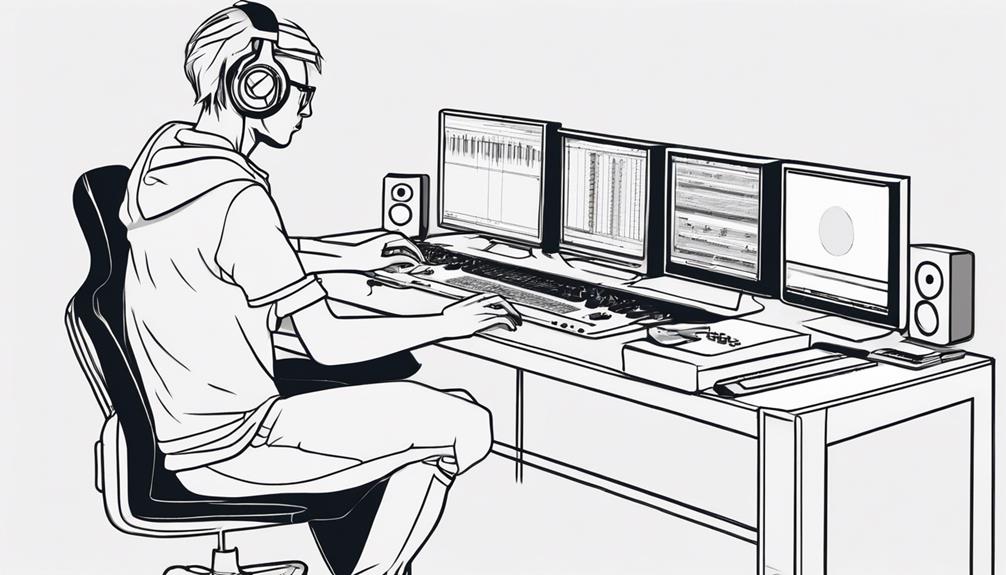
Enhancing your music production skills involves developing proficiency in using digital audio workstations and mastering sound design techniques. To excel in music production, consider the following key steps:
- Master Your DAW: Whether you prefer Pro Tools, Ableton Live, Logic Pro, or FL Studio, understanding your digital audio workstation inside out is essential for seamless music production. Explore different features, shortcuts, and plugins to enhance your workflow and productivity.
- Utilize MIDI Controllers: Incorporating a MIDI controller into your setup can revolutionize your music-making process. From creating melodies to tweaking parameters in real-time, a MIDI controller adds a hands-on approach to your productions, fostering creativity and spontaneity.
- Focus on Sound Design: Dive deep into the world of sound design to craft unique sounds that define your signature style. Experiment with synthesizers, effects, and audio manipulation techniques to add depth and character to your tracks during mixing and mastering sessions.
Nurturing Creativity in Production
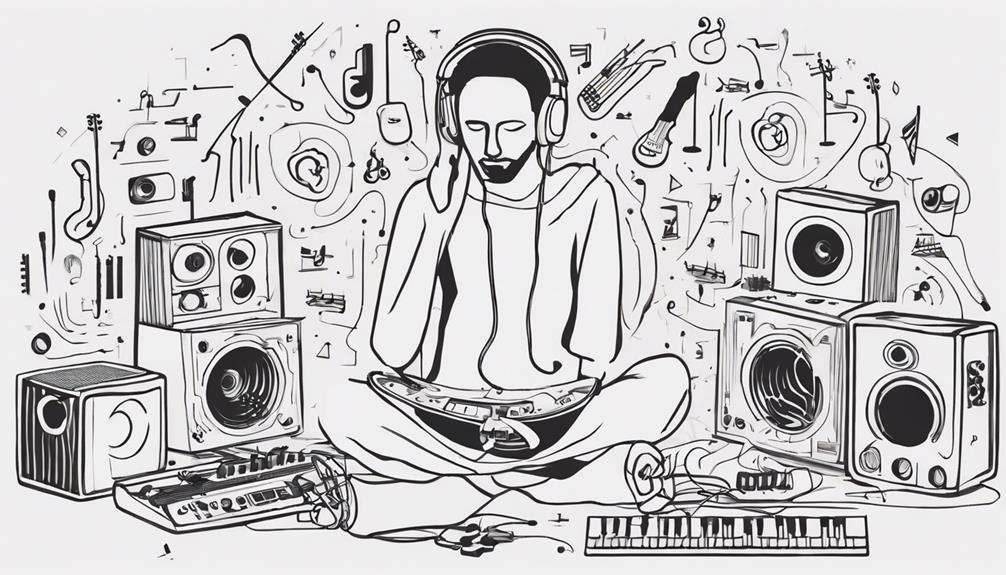
Developing creativity in music production involves exploring diverse genres, instruments, and production techniques to foster innovation and originality in your work. Experimenting with different styles can help you discover unique combinations that set your music apart. Collaborating with other artists and producers can bring fresh perspectives, inspiring creativity and pushing boundaries. Creating a signature sound that reflects your personality and musical vision can make your work instantly recognizable. Embracing innovation and thinking outside the box are essential to staying ahead in the ever-evolving music industry. To nurture your creativity effectively, consider the following:
| Key Ideas | Description |
|---|---|
| Creativity | Essential for producing unique sounds and arrangements |
| Experimenting | Trying out new genres, instruments, and techniques |
| Collaborating | Working with others to spark new ideas |
| Signature Sound | Developing a distinct style that sets you apart |
| Innovation | Embracing new ideas and approaches |
| Thinking outside the box | Pushing boundaries and exploring unconventional methods |
Collaborative Interpersonal Skills
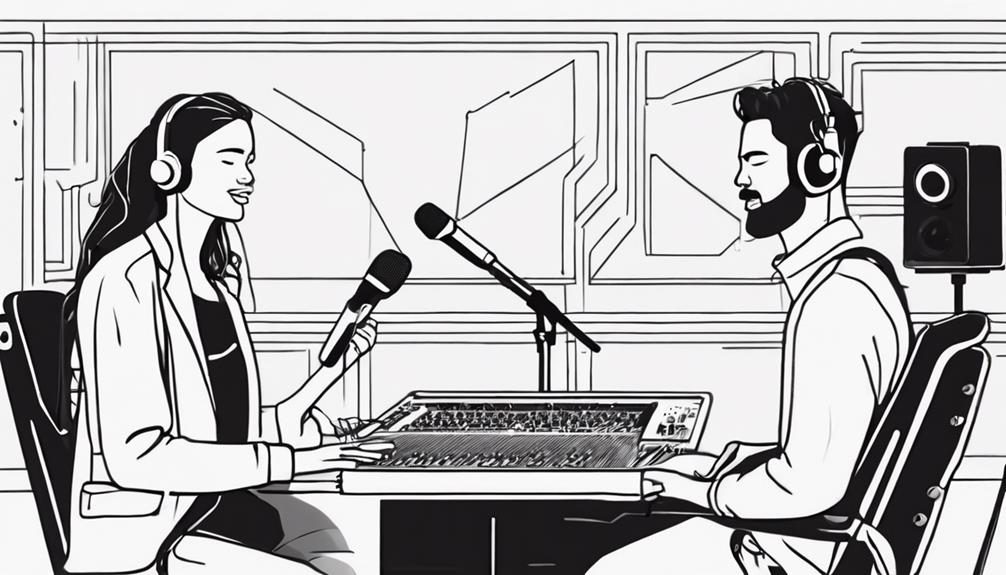
You need to understand the importance of teamwork in music production and how effective communication can elevate your collaborations.
Building strong relationships with artists and industry professionals through empathy and patience is crucial.
Remember that fostering a supportive work environment and being open to constructive feedback can lead to more successful and creative music projects.
Teamwork in Production
Effective teamwork in music production relies heavily on strong collaborative interpersonal skills between producers, artists, engineers, and industry professionals. To excel in this aspect, consider the following:
- Building Relationships: Cultivating strong connections within your production team fosters trust and enhances communication, paving the way for successful collaborations.
- Embracing Constructive Criticism: Being open to feedback and offering constructive criticism in a respectful manner creates a positive and growth-oriented collaborative environment that pushes the project forward.
- Promoting Open Communication: Encouraging open dialogue and active listening among team members promotes that ideas flow freely, creativity flourishes, and any obstacles are addressed effectively.
Communication With Collaborators
How can you enhance your music production collaborations through effective communication with your collaborators?
Collaborative interpersonal skills are essential for building positive working environments with artists, engineers, and other industry professionals. Effective communication involves actively listening to artists' needs, providing constructive feedback, and resolving conflicts professionally.
By developing empathy and understanding different perspectives, you can enhance collaborative efforts in music production. Strong communication skills not only lead to smoother production processes but also result in better creative outcomes and long-lasting professional relationships.
Remember, clear and open communication is key to successful collaborations in the music industry. By fostering a culture of respect, trust, and understanding, you can create a conducive environment for creativity to flourish and for projects to reach their full potential.
Strengthen your interpersonal skills to elevate your music production collaborations to new heights.
Work Ethic and Music Production
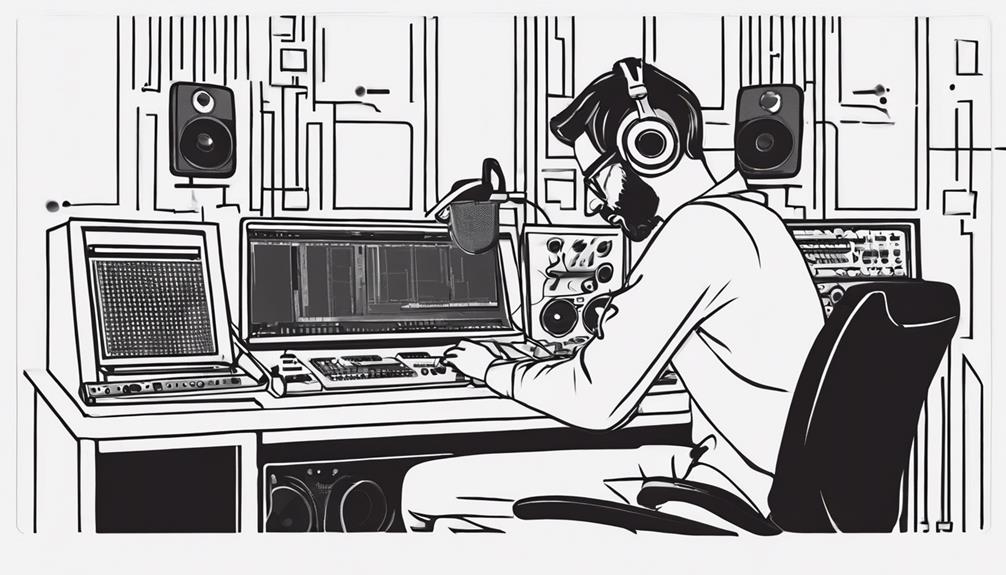
To excel in music production, you must embody determination, master time management skills, and prioritize consistency.
Your ability to stay focused, meet deadlines, and hone your craft will set you apart in the industry.
Embrace the challenge of pushing your creative boundaries while maintaining a strong work ethic.
Determination in Music
Maintaining a strong work ethic is essential in music production, requiring dedication and perseverance to excel in composing, recording, and editing tracks effectively. To succeed in this field, you must embody determination and passion for your craft.
Here's how you can showcase your commitment:
- Embrace Challenges: Approach obstacles as opportunities for growth and learning. Overcoming hurdles in music production will only make you stronger and more skilled in your art.
- Seek Feedback: Be open to constructive criticism and use it to refine your work. Feedback from others can provide valuable insights that help you enhance your production quality.
- Set Goals: Establish clear and achievable goals for your projects. Having a roadmap not only keeps you focused but also fuels your drive to accomplish milestones in your music production journey.
Time Management Skills
Effective time management skills are essential for success in music production, allowing you to meet deadlines and maintain productivity throughout the creative process. Balancing various tasks like composing, recording, editing, and mixing demands a strong work ethic and the ability to allocate time effectively. Prioritizing music production tasks based on their importance and urgency is vital for maintaining an efficient workflow. Setting realistic goals and creating a structured work schedule can help you maximize productivity and reduce procrastination in music production. Developing a routine and sticking to it can enhance your focus and creativity.
| Time Management Tips | Benefits | Implementation |
|---|---|---|
| Prioritize tasks | Efficient workflow | Use the Eisenhower Matrix to categorize tasks |
| Set realistic goals | Increased productivity | Break down large projects into smaller, manageable goals |
| Create a structured schedule | Minimize procrastination | Use tools like calendars and productivity apps to plan your day |
Consistency Is Key
Developing a strong work ethic in music production involves dedicating consistent daily time to honing your skills and working on projects. Consistency is key in becoming a successful music producer.
Here are three essential aspects to take into account:
- Dedication: Committing yourself to regular practice and improvement is crucial in music production. Consistent effort and perseverance will help you grow as a producer.
- Work Ethic: Cultivating a strong work ethic will enable you to meet deadlines, stay motivated, and push through challenges in your music production journey.
- Commitment to Learning: Music production is a dynamic field that requires ongoing education. Stay committed to learning new techniques, software, and trends to stay relevant and innovative in your work.
Handling Criticism Effectively
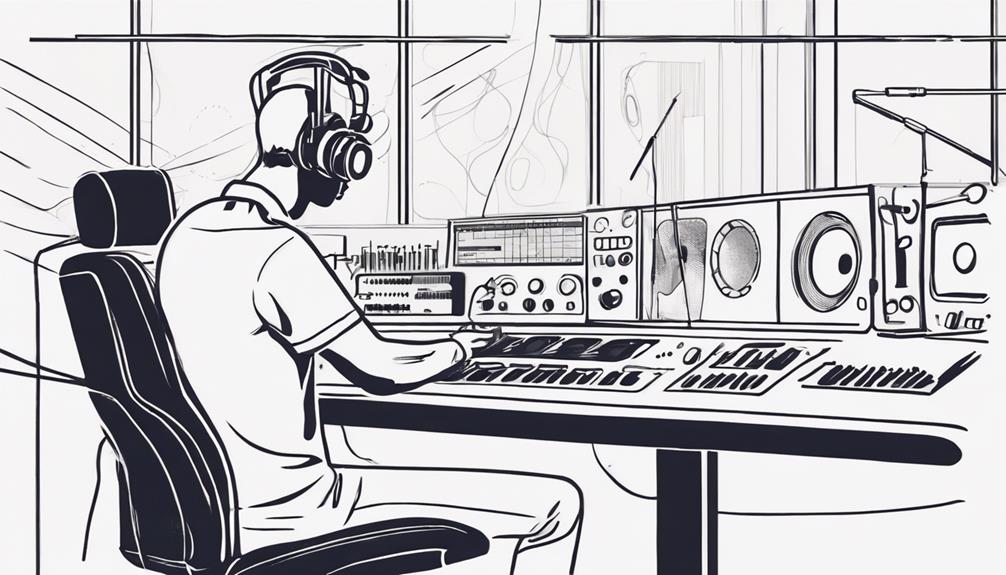
Receiving constructive criticism in music production requires an open-minded approach to feedback. To handle criticism effectively, you must be receptive to feedback and view it as an opportunity for personal growth.
Seeking feedback from others and being open to constructive criticism can provide valuable insights for improving your music production skills. It's crucial to balance external feedback with self-evaluation to guarantee a well-rounded view of your work.
Embracing diverse perspectives on your music can lead to significant progress in your craft. Remember, using criticism as a tool for learning and growth is vital to honing your skills in music production.
Meeting Deadlines in Production
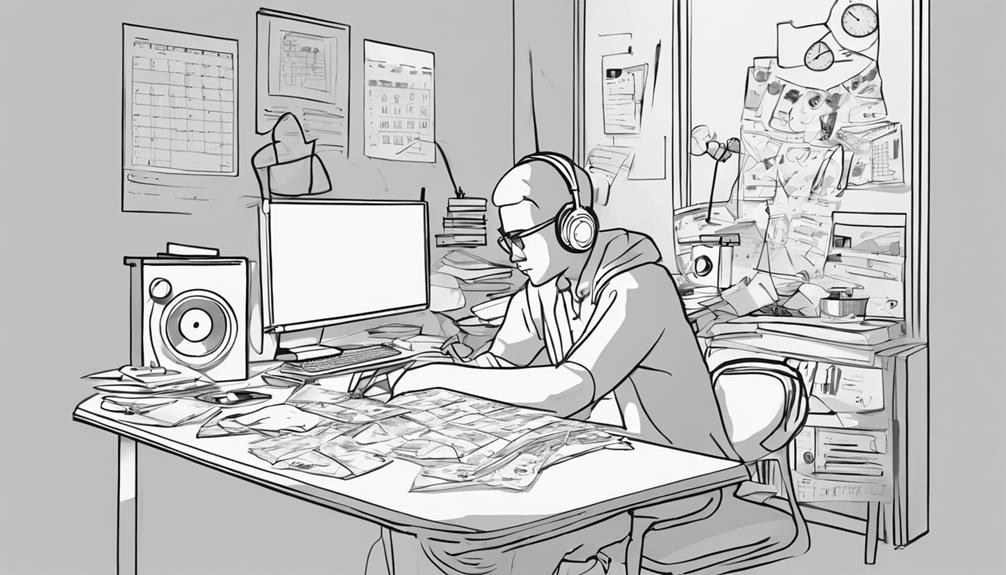
To guarantee successful project completion and maintain professional standards, producers in music production must prioritize meeting deadlines efficiently. Meeting deadlines in music production is vital for delivering projects on time and building strong professional relationships.
To achieve this, consider the following:
- Effective Time Management: Efficiently allocating time to different tasks is essential for meeting production deadlines. Utilize tools like calendars and project management software to stay organized and on track.
- Clear Communication: Regularly communicate with team members, clients, and stakeholders to make sure everyone is on the same page regarding project timelines and milestones. Clear communication can prevent misunderstandings and delays.
- Prioritizing Tasks: Identify critical tasks and prioritize them based on their importance and deadlines. By focusing on essential elements first, you can ensure that key project components are completed on time, contributing to overall project success.
Adaptability to Industry Trends

Remaining adaptable to industry trends is essential for music producers seeking sustained success in an ever-evolving landscape. The music production industry is constantly changing, with new technologies, sounds, and styles emerging regularly. To stay relevant, successful producers must keep abreast of these evolving industry trends. This involves staying updated on the latest software, equipment, and production techniques to remain competitive. They should also focus on expanding their skill set by learning how to use music apps effectively, as these tools are becoming increasingly integral to modern production workflows. Understanding how to integrate these apps into their creative process can open up new possibilities for experimentation and innovation. By embracing both traditional techniques and cutting-edge technologies, producers can position themselves as versatile and forward-thinking creators in the music industry.
Adapting to shifts in consumer preferences and the rise of various streaming platforms is also vital for long-term success in music production. Flexibility is key when it comes to adapting to industry trends. Producers who are willing to experiment with different genres, sounds, and production methods are better equipped to navigate the dynamic landscape of music production.
Embracing change, innovation, and creativity is what sets apart the most successful producers in the industry. By staying adaptable and open to new ideas, you position yourself for success in the ever-changing world of music production.
Drive for Creating Impactful Music
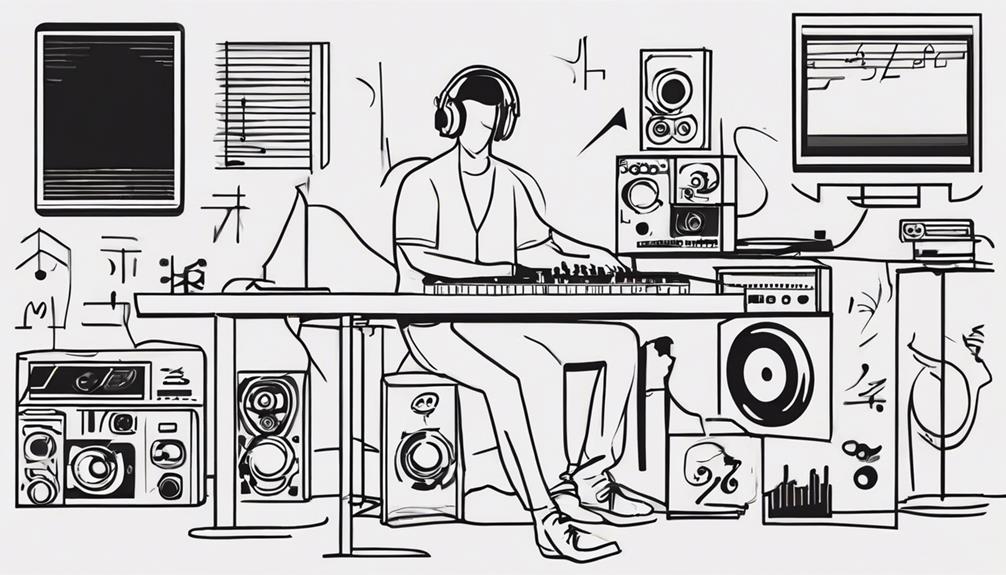
Assess if you genuinely feel a strong desire to create music that deeply touches the hearts and minds of your audience.
Consider if you're truly motivated to make a significant impact in the music industry by showcasing your distinctive sound and artistic flair.
Evaluate if you're passionate about composing melodies, writing lyrics, and producing tracks that resonate with listeners on a profound level.
Passion for Music
Your commitment to create impactful music is fueled by a deep passion for music production. Aspiring music producers like you thrive on the love for music and the creative process it entails. To excel in this field, you must immerse yourself in the intricacies of music theory, dedicating time to master technical skills and understand the industry's dynamics.
Here's how your passion can guide you:
- Engage Fully: Engage in the world of music production with enthusiasm, dedicating yourself to honing your craft.
- Embrace the Creative Journey: Enjoy the process of composing, arranging, and mixing music, relishing every moment of creation.
- Stay Hungry for Knowledge: Be open to experimentation and continuous learning, fueling your passion with a thirst for growth and improvement.
With dedication and a genuine love for music, you can channel your passion into creating impactful and meaningful music that resonates with audiences.
Artistic Expression
To excel in music production, harness your drive for artistic expression to create impactful and memorable music that resonates with audiences.
Artistic expression in music production involves delving into emotions, weaving engaging stories, and transforming ideas into compelling audio experiences. By pushing creative boundaries and experimenting with various genres, sounds, and techniques, you can craft innovative music that captivates listeners.
Producers who possess a deep understanding of artistic expression can convey emotions effectively through their music, evoking powerful feelings in their audience. This ability to connect on an emotional level showcases a profound grasp of the impact that music can have.
Attention to detail, a willingness to take creative risks, and a commitment to leaving a lasting impression on listeners are all essential components of expressing oneself artistically in music production.
Embrace the challenge of exploring new avenues of creativity, and let your passion for artistic expression drive you to create music that resonates deeply with your audience.
Frequently Asked Questions
How Do I Know if I Should Be a Music Producer?
You should consider your passion for music, technical interest, creativity, and ability to direct artists. Evaluate your commitment to continuous learning and improving skills, interpersonal relationships, and career goals in music production to determine if it's right for you.
Can I Self Teach Myself Music Production?
You can definitely self-teach music production! Utilize online resources like YouTube, Skillshare, and Coursera. Dedication, discipline, and a willingness to learn from mistakes are key. With practice and passion, you can achieve professional-level skills.
How Do I Find My Music Production Style?
To find your music production style, experiment with genres, analyze favorite producers, consider influences, collaborate with others, and evolve based on feedback and trends. Embrace your creativity and instincts to develop a unique sound.
Is Music Production a Skill or Talent?
Music production is both a skill and a talent. You can cultivate your abilities through dedication and practice. With passion and persistence, you can master the technical and creative aspects of music production, creating your unique style.
Conclusion
As you reflect on the qualities of a music producer, remember that success in this field requires a blend of musical knowledge, technical skills, creativity, and interpersonal abilities.
Just like a DJ mixing beats or a composer orchestrating melodies, you have the power to create impactful music that resonates with listeners.
So, if you have the passion, drive, and determination to make your mark in the music industry, then music production just might be the perfect fit for you.


